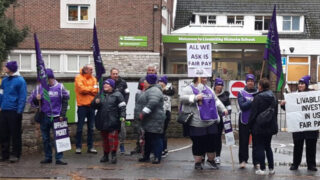Opening the session, general secretary Dave Prentis said: “We are five years into an austerity agenda which has wreaked havoc with our members pay and conditions.
“As a union, we have survived and last year alone, we recruited some 166,000 new members. But now we need to strengthen our resolve for the turbulent times we know we face.”
Activists representing regions, service groups and sectors from across the union took part in wide-ranging discussions and a series of workshops looking at how to engage all our members in developing our strategy on pay in a time of continuing austerity.
The aim is to work across local government, health care, police and justice, higher education, energy and the water, environment and transport service groups to implement a union-wide approach.
Mr Prentis said the union was facing a range of issues which would have an impact on our union’s organisation – including a continuing squeeze on public sector pay; a trade union bill that threatens to impose a wide range of burdens on unions trying to organise industrial action, and planned reductions in tax credits which threaten to cut the real income of some our members’ families by over £1,000 a year.
“We are going to fight back,” Mr Prentis said. “Unless an organisation like ours speaks up on this, then no voice will be heard.”
Key to the issues the union needs to grapple with is how to get more of our members actively involved in union campaigning around pay, the summit heard.
With new thresholds proposed for strike ballots, it was more important than ever that the union develops the sort of face to face contact with members that will ensure that our campaigns are underpinned with member support.
NEC policy committee chair Jane Carolan said: “We know that some of our members are having to use food banks. Our welfare charity is giving out grants for schools clothes; and many of our young members fear they are never going to afford a home of their own.
“The issues could not be more stark – how can we harness that experience into real engagement with our campaigning?”






